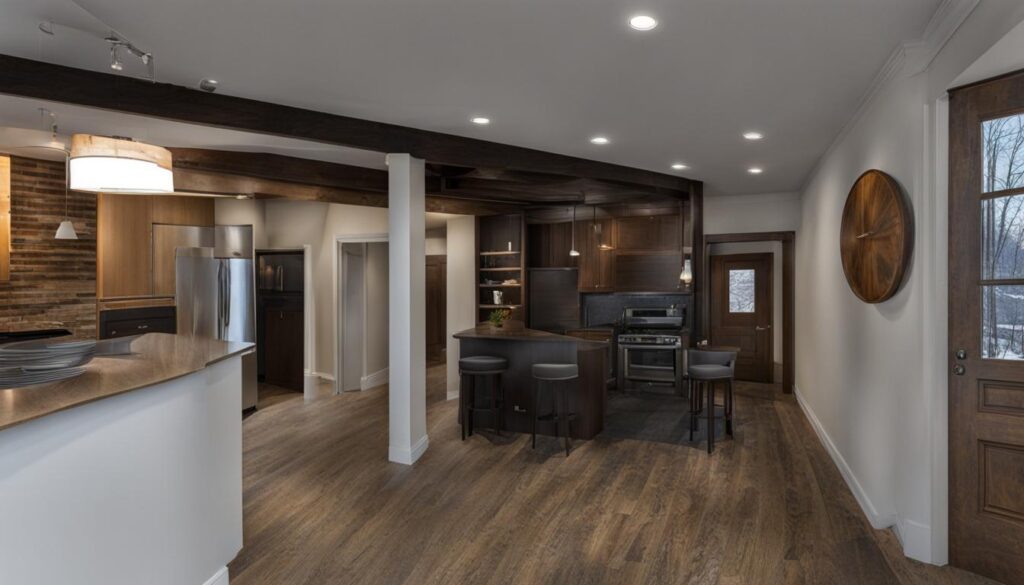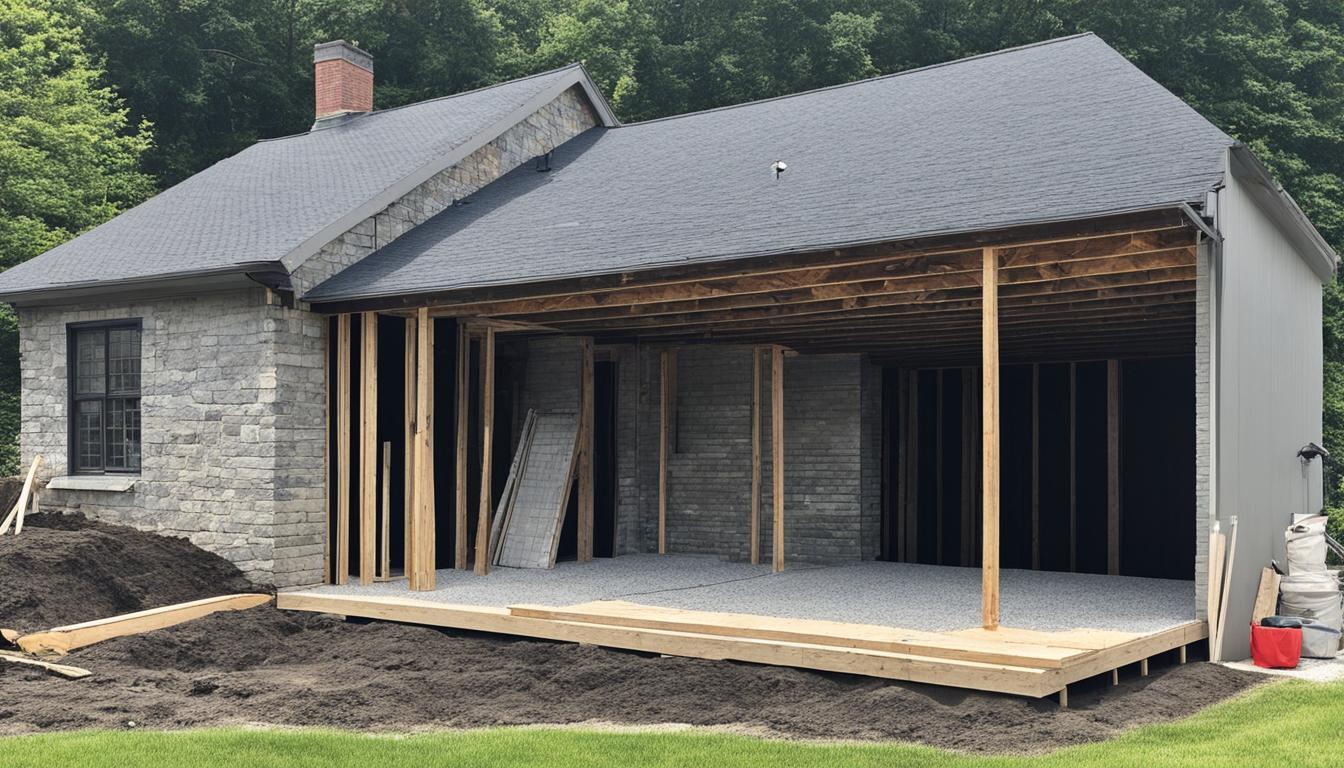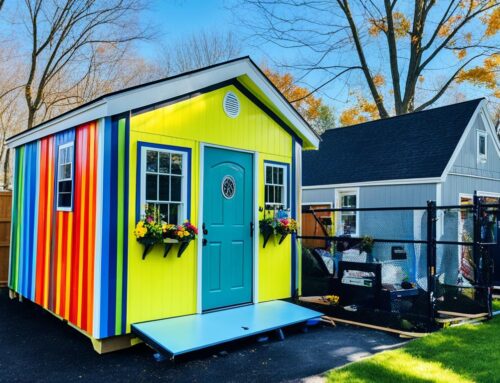Are you planning to sell a house with an unpermitted finished basement in NY? Selling a house with unpermitted work or open permits in New York poses additional challenges. It’s crucial to understand the permit process, know when permits are needed, and explore how to sell a home with permit issues in New York.
At Traci’s Permits, we offer unmatched expertise in Nassau and Suffolk County NY permits. We ensure timely approvals and code compliance for hassle-free construction. With our help, you can navigate the complexities of selling a house with an unpermitted finished basement in NY. Trust us for a smooth permit journey.
Key Takeaways:
- Understanding the permit process is crucial when selling a house with unpermitted work in NY.
- Building permits are necessary to ensure compliance with local standards and safety regulations.
- Certain projects require building permits, while others may not.
- Homeowners often avoid obtaining permits due to the time-consuming process and associated costs.
- Expired or open permits can cause issues when selling a house, similar to unpermitted work.
What Are Building Permits and Why Do You Need Them?
Building permits play a crucial role in ensuring that a house meets local standards and safety regulations. They are essential for various construction and renovation projects, and obtaining them is a necessary step in the building process. But why do you need building permits? Let’s explore their importance and the reasons behind obtaining them.
Building permits are a legal requirement for most construction projects. They are issued by the local government or building department to ensure that the proposed work complies with zoning laws, building codes, and safety regulations. By obtaining a permit, you are ensuring that your project is constructed correctly and poses no threat to the occupants or the community.
“Building permits are necessary to hold tradespeople accountable and to avoid issues when selling the house.”
One of the key reasons for obtaining building permits is to hold tradespeople accountable for their work. When you hire licensed professionals, they are required to follow the approved plans and abide by the building codes. Inspections are conducted at various stages of the project to ensure compliance, providing assurance that the work is being done up to standards.
Moreover, building permits are crucial when selling a house. Potential buyers will likely inquire about any renovations or additions, and having the proper permits in place adds value and credibility to your property. It also reduces the risk of future complications that may arise due to unpermitted work.
The key reasons why you need building permits are:
- Compliance with local standards and safety regulations.
- Accountability for tradespeople and licensed professionals.
- Added value and credibility when selling the property.
- Reduced risk of future complications.
An important aspect of obtaining building permits is the documentation and record-keeping involved. Having the proper permits not only protects you from potential legal issues but also provides a documented history of the work done on your property. This documentation can be beneficial when planning future projects or if issues arise down the line.
Building permits are an investment in the long-term integrity and value of your property. By following the proper channels and obtaining the necessary permits, you ensure that your construction or renovation project is in compliance with the law, meets safety standards, and offers a sound investment for the future.
What Types of Projects Require a Building Permit?
Before initiating any construction or renovation project, it is crucial to determine whether a building permit is required. Building permits ensure that the work carried out complies with local regulations, safety standards, and building codes. Here are some examples of projects that typically require a building permit:
- Adding, moving, or removing walls.
- Electrical and plumbing work (excluding minor repairs).
- Building or replacing a deck.
- Installing a large fence.
- Adding a swimming pool.
- Erecting a shed.
- Removing or demolishing any structure.
- Changing the use of an area.
- Creating an accessory apartment.
- Cutting new holes for doors, windows, and skylights.
It is important to note that while these examples represent common projects requiring building permits, specific requirements can vary by location. Additionally, not all projects necessitate a building permit. Certain activities like painting, trim work, flooring replacement, and some landscaping projects may not require a permit. However, it is always recommended to consult with the local building department or obtain professional advice to ensure compliance with the regulations in your area.

| Project | Requires Building Permit |
|---|---|
| Adding, moving, or removing walls | Yes |
| Electrical and plumbing work (excluding minor repairs) | Yes |
| Building or replacing a deck | Yes |
| Installing a large fence | Yes |
| Adding a swimming pool | Yes |
| Erecting a shed | Yes |
| Removing or demolishing any structure | Yes |
| Changing the use of an area | Yes |
| Creating an accessory apartment | Yes |
| Cutting new holes for doors, windows, and skylights | Yes |
| Painting | No |
| Trim work | No |
| Flooring replacement | No |
| Landscaping projects (varies) | No (varies) |
Why Do Some People Avoid Getting Permits in New York?
Obtaining permits for construction or renovation projects in New York can be a daunting task. The process is often time-consuming, with approvals that can take months to obtain. Homeowners may find this lengthy process to be a major deterrent to getting the necessary permits. Additionally, the associated costs of permits, including filing fees and potential tax increases, can be a financial burden for some homeowners.
Another factor that contributes to homeowners avoiding permits is the impact of the COVID-19 pandemic. The pandemic has caused delays in the permit approval process, exacerbating an already challenging situation. With the uncertainty surrounding the timeline for obtaining permits, some homeowners opt for unpermitted work to avoid these delays and hassles.
“The time-consuming permit process and associated costs can discourage homeowners from obtaining the necessary permits for their projects. The COVID-19 pandemic has only added to the challenges, leading some homeowners to choose unpermitted work.”
There are also cases where homeowners may not be fully aware of the permit requirements or the consequences of unpermitted work. Lack of knowledge or misinformation can lead to homeowners unintentionally bypassing the permit process. This lack of awareness further contributes to the prevalence of unpermitted work in certain areas.
Despite the reasons for avoiding permits, it is important to note that unpermitted work can have significant consequences. It can result in fines, penalties, project delays, and potential difficulties when selling the property in the future.
Overall, while the challenges of obtaining permits in New York are undeniable, it is crucial that homeowners understand the importance of following the proper permitting process. Seeking out expert guidance and assistance can help navigate the complexities of obtaining permits and ensure a smooth and compliant construction or renovation project.
| Reasons for Avoiding Permits | Challenges of Obtaining Permits | Common Reasons for Unpermitted Work |
|---|---|---|
| Time-consuming process | Lengthy approval timelines | Lack of knowledge or awareness |
| Costs associated with permits | Financial burden on homeowners | Misinformation or confusion |
| COVID-19 delays | Additional challenges during the pandemic | Unintentional bypassing of permits |
What is an Expired or Open Permit?
In the world of construction and home improvement projects, permits play a crucial role in ensuring compliance with safety regulations and building codes. However, sometimes permits expire or remain open, leading to potential complications. Let’s explore the concept of expired and open permits, along with the consequences they can have.
Expired Permits: A Missed Deadline
An expired permit refers to a situation where a permit was initially issued for a project but was not closed out properly within the designated timeframe. This failure to close out the permit can occur due to various reasons, such as a missed deadline or a lack of proper documentation.
When a permit expires, it indicates that the project is incomplete or has not met all the necessary requirements. This can result in significant consequences, as the work may not be officially approved or inspected by the relevant authorities.
Open Permits: Incomplete or Non-Compliant Projects
On the other hand, open permits are permits that have not been closed despite the completion of the project. While an open permit may seem harmless, it can actually cause similar issues as unpermitted work.
Open permits suggest that a project may be incomplete or non-compliant with building codes. This can create uncertainty and potential liabilities for both homeowners and potential buyers. It’s essential to address open permits to ensure that the property meets all the necessary requirements.
“Expired and open permits may appear innocuous at first, but they can have serious consequences for property owners. It’s important to understand and resolve these permit-related issues to avoid legal complications and ensure peace of mind.”
Consequences of Open Permits
The consequences of open permits can vary depending on the specific circumstances and local regulations. Some possible consequences include:
- Difficulty in obtaining financing or insurance for the property
- Delays in property transactions or sales
- Potential fines or penalties from local authorities
- Negative impact on property value and marketability
- Risks of safety hazards or unpermitted work
It’s crucial to address open permits promptly to mitigate these consequences and ensure a smooth and transparent process when buying or selling a property.
Now that we understand what expired and open permits are and their potential consequences, let’s explore how to determine if a property has open permits or unpermitted work in the next section.
How Do I Know If My House Has Open Permits or Has Unpermitted Work?
If you’re concerned about the permit status of your house and whether it has any unpermitted work, there are a few steps you can take to find out. One method is to submit a Freedom of Information Law (FOIL) request to your local municipality. This request should include a search for open permits, which are permits that have been issued but not closed out properly.
To support your FOIL request, it’s also advisable to ask for a certificate of occupancy (C/O) report. This report will provide valuable information about the current status of the property, including any open permits that may exist. Keep in mind, however, that FOIL requests may not reveal unpermitted work specifically.
If you suspect unpermitted additions or renovations, additional inspections and a review of property materials may be necessary. A qualified inspector can assess the property and identify any unpermitted work that may have been done.
It’s crucial to be proactive in checking for open permits and identifying unpermitted work. Doing so will arm you with the necessary information to address any permit issues effectively, whether you plan to sell your house or make necessary changes.
Steps to Check for Open Permits and Identify Unpermitted Work:
- Submit a FOIL request to your local municipality to search for open permits
- Request a certificate of occupancy (C/O) report
- Consider hiring a qualified inspector to assess the property
- Review property materials and renovations for any signs of unpermitted work
By following these steps, you can gather the necessary information to address open permits and unpermitted work, ensuring a smooth process when selling your house or making necessary changes.
Selling a House with Unpermitted Work or Open Permits in New York
When it comes to selling a house with unpermitted work or open permits in New York, homeowners have several options to consider. Whether you choose to rectify the permit issues, sell the house as-is, or obtain retroactive permits, each approach comes with its own set of considerations.
If you decide to rectify the unpermitted work before selling, you’ll need to address the issues and ensure compliance with local building codes. This may involve undoing certain projects, bringing them up to code, or working closely with your local municipality to legalize the additions. Keep in mind that rectifying the work can be time-consuming and may require additional expenses.
On the other hand, selling the house as-is with full disclosure of the permit issues is another option. When taking this route, it’s crucial to be transparent about the unpermitted work and provide all relevant information to potential buyers. Selling a house as-is may result in a lower sale price, as buyers may factor in the cost of rectifying the permit issues themselves.
Obtaining retroactive permits is also a potential avenue, but it comes with its own set of challenges. Retroactive permits involve seeking approval for work that was previously completed without permits. This process requires upfront costs, including fees and potential repairs, and there’s no guarantee of approval.
Proceed with Caution
Selling a house with unpermitted work or open permits in New York requires careful consideration of legal requirements and potential consequences. It’s essential to consult with professionals such as real estate agents, attorneys, or permit specialists who can guide you through the process and ensure compliance with local regulations.
Remember that the information in this section is for informational purposes only and should not be considered legal or professional advice. Each situation is unique, and it’s important to consult with the relevant professionals to make informed decisions.
| Selling Options | Key Considerations |
|---|---|
| Rectify the Unpermitted Work | – Time-consuming process – Potential additional expenses – Ensure compliance with local building codes |
| Sell As-Is with Full Disclosure | – Transparency with potential buyers – Potential lower sale price – Buyers may need to rectify permit issues independently |
| Obtain Retroactive Permits | – Upfront costs and fees – Potential repairs – No guarantee of approval |

Remember, it’s crucial to act within the boundaries of the law and disclose all relevant information to potential buyers. By doing so, you can navigate the complexities of selling a house with unpermitted work or open permits in New York and ensure a smoother transaction.
Next, we’ll conclude this article and provide some important takeaways for selling a house with unpermitted work or open permits in New York.
Conclusion
When selling a house with unpermitted work in New York, it is crucial to navigate the legal considerations and understand the potential consequences. Homeowners must familiarize themselves with the permit process and be transparent with potential buyers regarding any unpermitted work. By taking these essential steps, sellers can ensure a smoother transaction and mitigate complications.
One tip for selling a house with unpermitted work is to educate yourself on the permit requirements and regulations in your area. Familiarize yourself with the specific permits needed for the work completed and understand the consequences of selling a house with unpermitted renovations. This knowledge will help you make informed decisions throughout the selling process.
Another important consideration is to disclose any unpermitted work to potential buyers. Transparency is key, as it prevents future legal issues and builds trust. Clearly communicate the details of the unpermitted work, including the scope, potential risks, and any measures taken to rectify the situation.
Lastly, explore the options available for rectifying the unpermitted work. Depending on the extent and nature of the renovations, obtaining retroactive permits may be a viable solution. Consult with professionals, such as permit expediter services, who can guide you through the process and assist in obtaining the necessary documentation.
Selling a house with unpermitted work in New York requires careful attention to legal requirements, honest communication, and proactive measures. By following these tips and considering the unique circumstances of your situation, you can successfully navigate the complexities and achieve a fair and satisfactory sale.
FAQ
What are building permits and why do you need them?
Building permits ensure that a house complies with local standards and safety regulations. They are necessary to hold tradespeople accountable and to avoid issues when selling the house. Obtaining permits helps maintain the value of the property and reduces the risk of having to remove or redo unpermitted work in the future.
What types of projects require a building permit?
Projects that generally require building permits include adding, moving, or removing walls, electrical and plumbing work (excluding minor repairs), building or replacing a deck, installing a large fence, adding a swimming pool, erecting a shed, removing or demolishing any structure, changing the use of an area, creating an accessory apartment, and cutting new holes for doors, windows, and skylights. Painting, trim work, flooring replacement, and certain landscaping projects may not require permits.
Why do some people avoid getting permits in New York?
Some homeowners avoid getting permits in New York due to the time-consuming permit process, which can take months for approval. The costs associated with permits, including filing fees and potential tax increases, deter others. COVID-19 has also caused delays in the permit approval process. These factors contribute to homeowners opting for unpermitted work.
What is an expired or open permit?
An expired permit means that a permit was issued but was never closed out properly. Open permits can cause issues similar to unpermitted work, as they indicate incomplete or non-compliant projects. Reasons for open permits include projects being canceled, failed inspections requiring additional work, or lack of a final inspection.
How do I know if my house has open permits or has unpermitted work?
To determine if a property has open permits, a Freedom of Information Law (FOIL) request can be submitted to the local municipality. This request should include a search for open permits and a certificate of occupancy (C/O) report. However, FOIL requests may not reveal unpermitted work. Additional inspections and review of property materials may be necessary to identify unpermitted additions or renovations.
How can I sell a house with unpermitted work or open permits in New York?
When selling a house with unpermitted work, options include rectifying the issues before selling or selling the house as-is with full disclosure. Rectifying the work may involve undoing certain projects or working with the town to legalize additions. Selling as-is requires disclosing the unpermitted work and potentially accepting a lower sale price. Obtaining retroactive permits can be another option but involves upfront costs and potential repairs.












